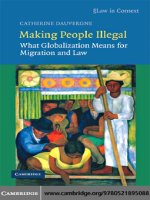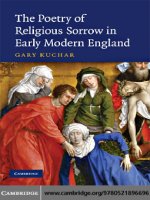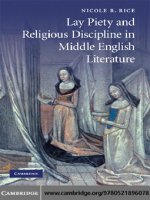cambridge university press a history of womens political thought in europe 1400 1700 feb 2009 kho tài liệu bách khoa
Bạn đang xem bản rút gọn của tài liệu. Xem và tải ngay bản đầy đủ của tài liệu tại đây (2.14 MB, 348 trang )
This page intentionally left blank
A HISTORY OF WOMEN’S POLITICAL
THOUGHT IN EUROPE, 1400–1700
This ground-breaking book surveys the history of women’s political
thought in Europe, from the late medieval period to the early modern
era. The authors examine women’s ideas about topics such as the
basis of political authority, the best form of political organisation,
justifications of obedience and resistance, and concepts of liberty,
toleration, sociability, equality, and self-preservation. Women’s ideas
concerning relations between the sexes are discussed in tandem with
their broader political outlooks; the authors demonstrate that the
development of a distinctively sexual politics is reflected in women’s
critiques of marriage, the double standard, and women’s exclusion
from government. Women writers are also shown to be indebted to
the ancient idea of political virtue, and to be acutely aware of being
part of a long tradition of female political commentary. This work
will be of tremendous interest to political philosophers, historians of
ideas, and feminist scholars alike.
jac qu el ine b ro ad is an Honorary Research Associate in the
School of Philosophy and Bioethics at Monash University. She
is author of Women Philosophers of the Seventeenth Century (2002)
and co-editor with Karen Green of Virtue, Liberty, and Toleration:
Political Ideas of European Women, 1400–1800 (2007).
k a r e n gr e e n is Associate Professor in the School of Philosophy
and Bioethics at Monash University. She is author of Dummett:
Philosophy of Language (2001) and The Woman of Reason (1995).
A HISTORY OF WOMEN’S
POLITICAL THOUGHT IN
EUROPE, 1400–1700
JACQUELINE BROAD
AND
KAREN GREEN
Monash University
CAMBRIDGE UNIVERSITY PRESS
Cambridge, New York, Melbourne, Madrid, Cape Town, Singapore, São Paulo
Cambridge University Press
The Edinburgh Building, Cambridge CB2 8RU, UK
Published in the United States of America by Cambridge University Press, New York
www.cambridge.org
Information on this title: www.cambridge.org/9780521888172
© Jacqueline Broad and Karen Green 2009
This publication is in copyright. Subject to statutory exception and to the
provision of relevant collective licensing agreements, no reproduction of any part
may take place without the written permission of Cambridge University Press.
First published in print format 2009
ISBN-13
978-0-511-48100-0
eBook (NetLibrary)
ISBN-13
978-0-521-88817-2
hardback
Cambridge University Press has no responsibility for the persistence or accuracy
of urls for external or third-party internet websites referred to in this publication,
and does not guarantee that any content on such websites is, or will remain,
accurate or appropriate.
For
Jeremy, Annalena, and Bethany
and
Tamsin, Michael, and Alexandra
Contents
Preface
page viii
Introduction
1
1 Christine de Pizan
10
2 Women of the Italian Renaissance
38
3 From Anne de Beaujeu to Marguerite de Navarre
60
4 Queen Elizabeth I of England
90
5 From the Reformation to Marie le Jars de Gournay
110
6 Women of the English civil war era
140
7 Quaker women
162
8 The Fronde and Madeleine de Scude´ry
180
9 Margaret Cavendish, Duchess of Newcastle
199
10 Women of the Glorious Revolution
11
Women of late seventeenth-century France
225
247
12 Mary Astell
265
Conclusion
288
Bibliography
Index
293
327
vii
Preface
It is a common view that in the history of political thought there are no
female figures on a par with men such as John Locke and Thomas
Hobbes. Our background and training in philosophy gave us little reason
to doubt this received wisdom. But our first defence – to quote Judith
Drake (fl. 1696–1723) – is that a man ought no more to boast of ‘being
Wiser than a Woman, if he owe his Advantage to a better Education, and
greater means of Information, then he ought to boast of his Courage, for
beating a Man, when his Hands were bound’.1 When it comes to the
history of ideas in Europe from 1400 to 1700, women had their hands
bound in many respects: through their lack of formal education in
political rhetoric, their official exclusion from citizenship and government, the perception that women ought not to be involved in political
affairs, and the view that it was immodest for a woman to write at all. But
there is a remarkable number who escaped their bonds: some were
educated to a high degree, some were self-educated, some attained the
highest levels of government and political authority, others were counsellors and companions to queens; many wrote political commentaries in
the guise of religious or prophetical works, and many of them defended
their writings with appeal to biblical and secular precedent. Taken
collectively, their works laid the foundations for subsequent generations of
European women whose demands for equality in education, employment,
and political representation are still not entirely met.
We began this project with the modest aim of showing simply that
there is a history of women’s political thought in Europe from 1400 to
1700. The result is an amalgam of our joint areas of expertise: Karen
1
[Judith Drake], An Essay In Defence of the Female Sex. In which are inserted the Characters
Of A Pedant, A Squire, A Beau, A Vertuoso, A Poetaster, A City-Critick, &c. In a Letter to a
Lady. Written by a Lady (London: Printed for A. Roper, E. Wilkinson, and R. Clavel,
1696), p. 20.
viii
Preface
ix
Green on women thinkers from the late medieval to the early modern
period in Italy and France, and Jacqueline Broad on women of the early
modern period in England. As historians of philosophy, we take a
common philosophical approach to these women’s writings: we focus
primarily on concepts, ideas, and arguments rather than historical events
and political actions (though we do discuss such subjects when they are
relevant). We cannot claim to have written a definitive or comprehensive
history: the terrain is simply too vast, and many of the political issues
are too complex to be adequately addressed in a historical-intellectual
overview. As a result, this book offers only one of many possible histories
that could have been written. We do not discuss women from Germany,
Spain, or the Netherlands. We do not comprehensively cover the implicit
political themes in women’s poetry, plays, and fictional works (though we
do discuss some). We do not, moreover, offer a detailed account of how
women have a different way of thinking politically compared to men, or a
history of political thought ‘in a different voice’. Had we attempted to
discuss male thinkers by way of comparison, the end-product would have
been gargantuan or else excessively simplistic.
There are at least three themes that emerge out of our research. First,
we find that many women entered into the political discourse of their
time aware that they were marked by men as political outsiders and
inferiors. At risk of being anachronistic, we suggest that almost all the
women we discuss were conscious of their gender. In many cases, this
awareness influenced their political thinking such that they recognised
the implications of their theories for women as a social group. Whether it
be the idea that women are capable of political virtue, or that women’s
participation is vital to a flourishing political community, or justifications
of women’s subordination and arguments in favour of passive obedience
to men, most female political thinkers made women politically visible.
In this respect, we intend our work to be a consciousness-raising exercise:
we hope to promote the idea that the female subject did exist, despite
being a forgotten or repressed feature in the history of European political
thought. Secondly, the study of these women demonstrates that the
thought of early modern women has as much continuity with what came
before as with what came after. For many scholars, the seventeenth
century represents a crucial period in which modern ideals – such
as feminism, liberalism, democracy, and secular political thought in
general – first emerged on the political landscape. But we find that the
early modern women have a great deal in common with their female
predecessors in the late medieval era and the Renaissance, especially when
x
Preface
it comes to the topics of political virtue, the religious foundations of
political authority and marriage, and the comparative virtues of men and
women. Thirdly, we found that many women writers were aware of their
female predecessors and contemporaries, and that several fashioned
themselves as part of a female intellectual tradition. Some continental
women made a conscious effort to represent themselves as part of a female
‘republic of letters’; some cited past queens and other female political
figures as inspiration for their reflections; and others saw themselves as
part of a long tradition of women (especially biblical women and sibyls or
prophetesses) who spoke with authority on political subjects.
This book would not have been possible without the generous
financial assistance of the Australian Research Council. The council
awarded us a large Discovery Project grant in 2004 for the purposes
of carrying out research into the history of women’s political thought,
and we are extremely grateful to them and to the anonymous ARC
reviewers who saw the merit in our original proposal. We also thank the
participants in our 2005 conference, ‘Toward a History of Women’s
Political Thought, 1400–1800’, many of whom contributed to our early
thinking about who and what should be included in such a history. We
are especially grateful to our keynote speakers at the conference – Hilda
L. Smith, Sarah Hutton, Patricia Springborg, and Catherine Mu¨ller – for
sharing their incomparable expertise in the area; to Earl Jeffrey Richards,
for his participation and his ongoing support; and to Lisa CurtisWendlandt, for her help in organising the event. We are also grateful to the
French Embassy for their sponsorship of Catherine Mu¨ller’s participation,
and to Edouard Mornaud of the Alliance Franc¸aise de Melbourne, for
organising this assistance and for providing the conference venue. We
thank Springer Press for their permission to reproduce (in Chapter 6)
sections of Jacqueline Broad’s essay ‘Liberty and the Right of Resistance:
Women’s Political Writings of the Civil War Era in England’, published
in our edited collection, Virtue, Liberty, and Toleration: Political Ideas of
European Women, 1400–1800, edited by Jacqueline Broad and Karen Green
(Dordrecht: Springer, 2007). We are also grateful to the church of Santa
Trinita` in Florence, Italy, for granting their kind permission to use
Domenico Ghirlandaio’s image Sibilla (from the Sassetti Chapel) on our
dust-jacket. We would like to thank Hilary Gaskin and the anonymous
CUP reviewers, for their many helpful and sensible suggestions on our
draft manuscript; our colleagues in the Philosophy Department at Monash
University, Melbourne, including Dirk Baltzly, John Bigelow, Sandra
Preface
xi
Bolton, Fiona Leigh, Justin Oakley, and Rob Sparrow; and our families
(especially Sandra Broad), for their terrific support and encouragement.
Finally, our work would have been poorer without the contribution of our
research assistant, Nicole Kouros, who brought to the project both skills in
Italian and a deep knowledge of Dante, as well as offering invaluable
assistance in the preparation of the final manuscript.
Introduction
In Some Reflections Upon Marriage (1700), Mary Astell (1666–1731) wryly
observes that it is ‘Men who dispute for Truth as well as Men who argue
against it; Histories are writ by them, they recount each others great
Exploits, and have always done so.’1 It might have pleased Astell to learn
that, more than three hundred years later, many women would also be
historians, and that women’s exploits now rate a mention in the standard
history books. More recently, women’s intellectual history has also begun
to receive scholarly attention. In the case of the history of political
thought, there have been several articles about women’s political ideas,
and a few monographs devoted to individual figures,2 as well as collections of essays on female political thinkers in particular historical periods
and locations.3 Recent developments in this area are partly due to the fact
that women’s political texts are now more publicly available than ever
before.4 But Astell’s observation still holds true in one respect: even
1
2
3
4
Mary Astell, Reflections Upon Marriage, in Astell: Political Writings, ed. Patricia Springborg,
Cambridge Texts in the History of Political Thought (Cambridge University Press, 1996), p. 77.
See Kate Langdon Forhan, The Political Theory of Christine de Pizan (Aldershot: Ashgate, 2002);
Barbara Stephenson, The Power and Patronage of Marguerite de Navarre (Aldershot: Ashgate, 2004);
Anna Battigelli, Margaret Cavendish and the Exiles of the Mind (Lexington: University Press of
Kentucky, 1998); Patricia Springborg, Mary Astell: Theorist of Freedom from Domination (Cambridge University Press, 2005); and Virginia Sapiro, Vindication of Political Virtue: The Political
Theory of Mary Wollstonecraft (Chicago and London: The University of Chicago Press, 1992).
Consider, for example, Hilda L. Smith (ed.), Women Writers and the Early Modern British Political
Tradition (Cambridge University Press, 1998); Tjiske Akkerman and Siep Stuurman (eds.), Perspectives on Feminist Political Thought in European History from the Middle Ages to the Present
(London: Routledge, 1998); and Jacqueline Broad and Karen Green (eds.), Virtue, Liberty, and
Toleration: Political Ideas of European Women, 1400–1800 (Dordrecht: Springer, 2007).
The accessibility of English women’s texts has been vastly improved by online collections such as
Early English Books Online (EEBO) and Eighteenth-Century Collections Online (ECCO). There are
also now a few anthologies of women’s political writings: Lynn McDonald (ed.), Women Theorists
on Society and Politics (Waterloo, Ontario: Wilfrid Laurier University Press, 1998); Hilda L. Smith
and Berenice A. Carroll (eds.), Women’ s Political and Social Thought: An Anthology (Bloomington:
Indiana University Press, 2000); Kirstin Waters (ed.), Women and Men Political Theorists: Enlightened
Conversations (Malden, MA, and Oxford: Blackwell Publishers, 2000); and Hilda L. Smith, Mihoko
1
2
Women’ s political thought in Europe, 1400–1700
though the best-known histories of political thought are no longer written
solely by men, they still tend to be about men – especially well-known
men, such as Plato, Aristotle, Dante, Machiavelli, Hobbes, Locke, and
Rousseau. In this book, we aim to redress the imbalance by providing a
history of women’s political thought in Europe from the late medieval to
the early modern period. The names of the women we discuss may not
all be as familiar as those of the men: our subjects include Christine
de Pizan, Isotta Nogarola, Cassandra Fedele, Laura Cereta, Marguerite de
Navarre, Queen Elizabeth I of England, Jeanne d’Albret, Arcangela
Tarabotti, Moderata Fonte, Lucrezia Marinella, Marie le Jars de Gournay, Katherine Chidley, Elizabeth Poole, Priscilla Cotton, Margaret Fell
Fox, Queen Christina of Sweden, Madeleine de Scude´ry, Margaret
Cavendish, Elisabeth of Bohemia, Elinor James, Joan Whitrowe, Anne
Docwra, Damaris Masham, Mary Astell, and Gabrielle Suchon – among
others. Though some of these women are no longer famous, many of them
were known by, and compared to, famous male theorists of their time and
discussed similar political issues in their works.
Some scholars might doubt the need to devote a book to female
political thinkers alone. They might argue that it is easier to assess the
significance and coherence of women’s political ideas when they are
placed alongside those of the other sex; and they might point out that,
apart from their gender, these women have very little in common socially,
geographically, chronologically, or ideologically speaking. But these are
observations that might be made about the majority of histories of political thought – histories that are seriously incomplete because they ignore
women thinkers. In any case, we do not completely disregard male
thought. Many of the women we discuss developed their work in response to male authors, and so we do consider the political ideas of men
such as Aristotle, John of Salisbury, Dante, John Knox, Thomas Hobbes,
and John Locke.
But we also think that women’s consciousness of gender in their
political thought is enough to warrant giving them a volume of their own.
It has been a common criticism of male political theorists that they tend
to forget about women, or that women are rendered invisible in their
Suzuki, and Susan Wiseman (eds.), Women’ s Political Writings, 1610–1725, 4 vols. (London: Pickering
and Chatto, 2007). The Cambridge University Press series ‘Texts in the History of Political Thought’
includes Astell: Political Writings; Margaret Cavendish, Political Writings, ed. Susan James (2003);
Christine de Pizan, The Book of the Body Politic, ed. and trans. Kate Langdon Forhan (1994); and
Mary Wollstonecraft, A Vindication of the Rights of Men and a Vindication of the Rights of Woman, ed.
Sylvana Tomaselli (1995).
Introduction
3
political discussions of family and citizenship. In her highly influential
work The Sexual Contract (1988), Carole Pateman observes that, in the
standard histories of social contract theory, there is a great, repressive
silence about women: their subordination to men is assumed but never
explicitly acknowledged.5 She argues that prior to the original contract
(a pragmatic justification of political authority and obedience), there must
be another agreement made between men for the purpose of dominating
and controlling women – the sexual contract. More recently, Hilda L.
Smith has argued that the early modern concept of citizenship implicitly
excludes women.6 Though ‘the citizen’ is intended to be a universal concept, applicable to both men and women, on closer inspection it turns out
to be reflective of male experience alone. In this book, we do not deny that
men have thought of themselves as paradigm citizens.7 But we do offer a
somewhat revised history of political thought: we show that not all political
writing in the pre-Enlightenment era renders women invisible, or fails
explicitly to mention the female sex and their political subordination or
exclusion.8 We examine what happens when the ‘subjects’ start to speak (to
borrow a post-modern phrase) or when women of the past developed their
own political theories and opinions. For some modern feminists, the results
may be surprising, and, perhaps, sometimes disappointing.9 Against their
misogynist critics, these women defend their capacity for political virtue,
they argue for women’s prudence, they defend female monarchs, and they
call for female liberty of conscience against the tyranny of men. Yet many
are intolerant and conservative, critical of those who bring about social
disorder for the sake of religious freedom and they are committed to
individual virtue and passive obedience to authority. In some cases, there is
also acceptance, and even justification, of women’s subordination to men.
5
6
7
8
9
Carole Pateman, The Sexual Contract (Stanford University Press, 1988).
Hilda L. Smith, All Men and Both Sexes: Gender, Politics, and the False Universal in England, 1640–
1832 (University Park, PA: Pennsylvania State University Press, 2002).
In addition, we do not deny that when male theorists such as Hobbes, Locke, and Rousseau do
mention women, they typically offer justifications of women’s subordination to men. On this
topic, see Susan Moller Okin, Women in Western Political Thought (Princeton University Press,
1979).
To be fair, in a more recent article, Pateman observes that a history of political thought without
women’s ideas is but a ‘truncated and partial’ story; see Carole Pateman, ‘Women’s Writing,
Women’s Standing: Theory and Politics in the Early Modern Period’, in Smith (ed.), Women
Writers and the Early Modern British Political Tradition, pp. 365–82 (esp. 367).
See Margaret King, Women of the Renaissance (Chicago: University of Chicago Press, 1991), p. 237,
and Joan W. Scott, Only Paradoxes to Offer: French Feminists and the Rights of Man (Cambridge,
MA: Harvard University Press, 1996). Both King and Scott express disappointment at the conservatism of the historical women they study.
4
Women’ s political thought in Europe, 1400–1700
Often, as Mary Astell observed in 1700, these women ‘Love their Chains’
and think ‘as humbly of themselves as their Masters can wish’.10 Instead of
calling for equal liberty, many women emphasise the duty of all human
beings to accept subordination to a higher authority. Such women insist
that even a prince is subordinate to God, and that love of God and
humility are virtues that men (as well as women) ought to acquire. But
whatever the viewpoint, these female political thinkers do not forget about
women: they consider the implications of their general political theories for
women as well as men. In this respect, regardless of a lack of radicalism in
some areas, a history of women’s political thought can offer a different
political perspective to that of the standard, exclusively male, histories.
A major methodological question raised by this research is: what
constitutes political thought and what counts as a political text? In
modern political theory, politics is often regarded as a separate sphere
from ethics. Theorists concentrate on questions concerning power, the
foundations and limits of political authority, the nature of political
obligation, and the tensions between liberty and distributive justice. On
this reading, the key concepts – to put it rather simply – are rights and
obligations, whether they are the rights (or entitlements) and obligations
of sovereigns, or the rights and obligations of subjects, and so on. Political
texts are those that discuss sovereign power (such as democratic, oligarchic, or monarchic power) and the relations between sovereigns and
subjects. Among the texts we consider, some conform to this paradigm
and others do not. In the later chapters of this work, we examine women’s
ideas about the basis of political authority, their theories about the best
forms of political organisation, their justifications of political obedience
or political resistance, and their various concepts of liberty in both the
family and the state. We also discuss the extent to which these ideas about
authority, obedience, and liberty are applied to the situation of women.
But we maintain that this modern paradigm of political thought is open
to question: it is the result both of the occlusion or forgetting of an earlier
political tradition, and of the exclusion of women and their concerns
from standard political theory. Our research thus expands the domain of
the political in two respects. First, it returns to the ancient Aristotelian
paradigm in which politics and ethics are united rather than opposed.
Secondly, it includes sexual politics, and so we cover texts such as Marguerite de Navarre’s Heptameron and Madeleine de Scude´ry’s Cle´lie which
are not usually thought of as political.
10
Astell, Reflections, p. 29.
Introduction
5
For Aristotle and the Stoic writers Seneca and Cicero (who accepted
the Aristotelian framework), the key political concepts are not rights and
obligations but virtue and the good.11 Aristotle’s political thought begins
with the premise that an individual’s participation in the political community is necessary in order for that individual to attain the good life
(eudaimonia). In Aristotle’s Politics, the city-state or polis is not regarded
as external to, or pitted against, the individual, but rather as the natural
means by which the individual is able to achieve the good. When Aristotle discusses the best form of political organisation, he discusses it with
regard to the form that will best promote the good life, and he sees the
virtues as habits that are conducive to this end. In this tradition ethics, the
nature of virtue, and politics are inextricably connected. Developing
Aristotle’s thought, the Stoics identify the good life with a life of virtue,
while the Epicureans make virtue a means to pleasure in a broad sense
(identified with eudaimonia). The Aristotelian approach to political
thought focuses on the appropriate character and virtues of members of
the polis, on issues such as civic friendship, and the best organisation for
promoting the best kind of life – topics that have not been central to
modern political thought. In the late medieval and Renaissance periods,
the Aristotelian political outlook was adapted by Giles of Rome, John of
Salisbury, and St Thomas Aquinas. During this period, the writings of
Aristotle and his Roman descendants, particularly Seneca and Cicero,
shaped and informed the subject matter of political philosophy, for both
male and female authors alike.
Women writers of the fifteenth century adapt and critique this tradition. The Aristotelian subject matter arises most strongly in their defence
of women’s capacity for virtue. Their approach can be summed up by the
idea, expressed by Christine de Pizan, that the good of the city is the good
of all its inhabitants, male as well as female. They insist that women are
capable of exercising all the virtues, and should be encouraged to develop
them. In his Politics, Aristotle implies that women do not have the prime
political virtue of prudence (phronesis), or the capacity to discern good
from evil in their practical deliberations. By denying women this capacity,
he appears to justify the exclusion of women from political authority,
their subordination to men, and their lack of qualification for full
citizenship. Women such as Christine de Pizan, Elizabeth I, and Lucrezia
Marinella explicitly challenge Aristotle’s denial of prudence to the female
11
For a nice summary of this topic, see C. C. W. Taylor, ‘Politics’, in The Cambridge Companion to
Aristotle, ed. Jonathan Barnes (Cambridge University Press, 1995), pp. 233–58 (esp. 233–5).
6
Women’ s political thought in Europe, 1400–1700
sex and his exclusion of women from participation in the polis. Other
women, such as Laura Cereta, Marguerite de Navarre, and Madeleine
de Scude´ry, question his assumptions concerning the nature of virtue.
Humility is not a virtue recognised by Aristotle, but these women exploit
the tradition of Christian virtue and promote humility in opposition to
arrogant pagan morality. Opposing Aristotelian and medieval representations of women as morally inferior, women defend their moral
worth, question men’s virtue, and propose new paradigms of the relations
between men and women. Based on a reading of Christianity according
to which grace is offered to the powerless, Marguerite hints that women
may be spiritually and morally superior to men. Marinella goes further
and adapts Platonist doctrine to establish women’s moral superiority and
the injustice of their subjection to men. We thus demonstrate the existence of a well-established tradition of women’s thought grounded in a
Christian synthesis of classical Aristotelian and Stoic political ideas, which
elevates women’s political contribution by equating the good life with the
exercise of virtue.
In pre-Enlightenment Europe, political thought was intertwined not
only with ethics and virtue, but also with religion and salvation. The
synthesis of political and religious thought continued well into the seventeenth century: a strong religio-political outlook can be found in the works
of Marie le Jars de Gournay, Elizabeth Poole, Mary Pope, Elinor James,
Gabrielle Suchon, and Mary Astell, among others. These women uphold a
divine conception of kingship and a view of monarchs as God’s instruments on earth; they have a pastoral conception of the monarch as a
protector of souls as well as bodies; and they offer Scripture-based arguments in favour of obedience to both just rulers and irreligious tyrants.
Some women also offer biblical arguments in favour of women’s political
subordination to men. But in other women’s writings of the time, religion
is not the entirely conservative or limiting force that we might expect it to
be.12 The writings of English women petitioners during the Civil War, and
Quaker women such as Priscilla Cotton, Mary Cole, Margaret Fell Fox,
and Anne Docwra, reveal that the Bible can be interpreted in a politically
progressive fashion. These women argue in favour of egalitarianism, liberty
of conscience, social justice for the poor, and the toleration of religious
diversity. They do not argue in favour of full citizenship for women, or
their freedom from political subordination to men but they do highlight
12
On this topic more generally, see Patricia Crawford, Women and Religion in England 1500–1720
(London and New York: Routledge, 1993).
Introduction
7
women’s equal interest in liberty of conscience (or freedom of worship),
they argue in favour of women’s spiritual equality with men, and they
defend the authority of women to speak in church. The long-lived popularity of Aristotelian and Stoic ideas concerning good government and
virtue is apparent in other women’s writings. In the late seventeenth century, in the works of Damaris Masham, Gabrielle Suchon, and Mary Astell,
we start to see arguments in favour of women’s intellectual cultivation both
for the sake of the country, and for the sake of women’s own virtue and
salvation.
Our expansion of the domain of political thought results in a broadening of the texts that we read as political. Modern political theorists tend
to concentrate their studies on prose treatises that deal exclusively with
issues of power and the legitimacy of the state. Niccolo` Machiavelli’s The
Prince (1532), Thomas Hobbes’s Leviathan (1651), and John Locke’s Two
Treatises of Government (1689) form the backbone of contemporary academic discussion on historical political theory. Some of the works that we
examine conform to this standard. Christine de Pizan’s Book of the Body
Politic (1407) and Book of Peace (1412–14), and Marie le Jars de Gournay’s
‘Farewell of the Soul of the King’ (1610) are political treatises that concentrate on the practice of good government and the relative rights and
responsibilities of monarchs and subjects. The politics of relations
between the sexes is also discussed in polemical writings that are not too
different from the standard political treatises: Christine de Pizan’s Book of
the City of Ladies (1405), Moderata Fonte’s The Worth of Women (1600),
Arcangela Tarabotti’s Paternal Tyranny (1643), Marie le Jars de Gournay’s
The Equality of Men and Women (1624), and perhaps Mary Astell’s Some
Reflections Upon Marriage (1700) are cases in point. But many women’s
works fall outside the standard models. Often women writers express
their ideas about the ideal state, relations between the sexes, and other
political issues through fiction, poems, pamphlets, petitions, and plays. In
doing so, they were typically following the fashion of the era in which
they wrote. In the early modern period and before, men sometimes
expressed their political views through the medium of poetry, as in John
Milton’s Paradise Lost (1667), and in fictional pieces, such as Thomas
More’s Utopia (1516), and Jonathan Swift’s Gulliver’ s Travels (1726).
In the following chapters, we include a discussion of some of the most
influential works in these genres, though it has been impossible to comment on every politically significant literary production by a woman.
This leads us to a final methodological question: what are the criteria
for inclusion in our history? Why do we include some writers and not
8
Women’ s political thought in Europe, 1400–1700
others? Needless to say, the first criterion is gender: because we propose to
address the forgotten or neglected history of women’s political thought,
the political texts in our study must be written by women. In the case of
multi-authored and anonymous or pseudonymous works, this is not a
straightforward matter. We know that Elizabeth I played a significant role
in the writing of her speeches and prayers, but there is evidence that these
were also the products of collaboration with male counsellors. Similarly,
though many women’s petitions of the English Civil War era were
written from a female point of view, and were presented to parliament by
women, there is some question about women’s authorial role in the
petitions. We include discussion of both Elizabeth and the Civil War
women, however, because there is plausible evidence on the side of female
authorship: Elizabeth was a highly educated, authoritative woman who
played a hands-on role in the fashioning of her public persona; and there
is historical and textual evidence that Katherine Chidley may have played
a leading part in the writing of the Leveller women’s petitions. Second,
we include only those women writers who articulate a coherent political
viewpoint, according to the definition of political thought discussed
above. In some cases, such as those of the English queens Mary I and
Mary II, there is simply not enough extant material to discern any particular viewpoint. The same problem arises with regard to Princess
Elisabeth of Bohemia and Queen Christina of Sweden, though we do
briefly discuss their extant opinions in relation to wider political themes.
Many historiographical conclusions might be drawn from our account
of women’s political ideas. According to the standard, all-male accounts,
the history of political thought is a history in which natural justifications
of political authority (such as patriarchalism and divine right theory)
are overthrown by conventional or contractual theories;13 biblical and
authority-based arguments are replaced by appeal to reason and rational
principles, and the religious world view gives way to the secular, liberal
philosophy of the Enlightenment – a philosophy in which liberty,
equality, and toleration play a central role. But these accounts may be the
result of historians concentrating on works that ground future trends,
rather than those that express widely accepted platitudes of the period in
question. Recent revisionist historians have challenged the idea of a
smooth and uncomplicated progress toward Enlightenment political
ideals. The study of women’s political writings may also lead to a shift in
13
See Gordon J. Schochet, The Authoritarian Family and Political Attitudes in 17th Century England:
Patriarchalism in Political Thought (New Brunswick and London: Transaction Books, 1988).
Introduction
9
our thinking about such progress. These texts come with little scholarly
baggage, and so the reader must evaluate them on their own terms: we
must pay attention to what the women actually said rather than what
current scholars say about them. Taken collectively, women’s political
writings offer a different – and, in many cases, a woman-centred – perspective on central problems and classic works within the history of
political thought. Their texts can be an affront to our modern ways of
thinking. Seemingly familiar political concepts – such as prudence, liberty, toleration, equality, and self-preservation – have quite different
connotations when discussed in their original religio-political contexts. In
addition, our study shows that feminist political thought has had a longer
pre-history than many theorists have recognised. The gender concerns of
pre-Enlightenment women may not always be secular or liberal in content, but they are nevertheless recognisably feminist or proto-feminist in
spirit.
Finally, it must be noted that many of these women acknowledge the
existence of their female predecessors. Some continental women, such as
Madeleine de Scude´ry, make a conscious effort to represent themselves as
part of a female ‘republic of letters’. Many women cite past queens and
other female political figures, such as Joan of Arc and the Amazons, as
inspiration for their political writings. Others legitimate their political
activism in print by appealing to a long tradition of women, especially
biblical exempla and sibyls or prophetesses, who were authoritative political advisers. There is also a plausible case to be made for the continuing
influence of Christine de Pizan: many women who exercised political
authority in the Renaissance period – including, in France, Anne de
Beaujeu, Margaret of Austria, Louise of Savoy, and Marguerite de
Navarre – were familiar with Christine’s works; and in England, it seems
likely that Elizabeth I and Margaret Cavendish also had access to
Christine’s writings. Many would agree that, in order to move forward
politically, women need to develop a consciousness of themselves as
political actors and theorists who belong to a tradition of female thought.
In writing this history, we hope to have contributed to women’s growing
historical self-consciousness, and to have demonstrated that women made
a far more profound contribution to the development of European
political ideas than has been generally acknowledged.
chapter 1
Christine de Pizan
Christine de Pizan (1364–1430) lived in France from the reign of Charles V,
through the madness of Charles VI, until the year in which the appearance
of Joan of Arc secured the succession of Charles VII. Christine thus suffered the effects of the conflict between the Armagnacs and Burgundians,
which had one of its murderous climaxes in the Cabochien uprising of 1413.
During this period, she wrote a number of works promoting princely
virtue, often intended for Louis of Guyenne, the eldest son of Charles VI,
and Isabeau de Bavie`re, who, she hoped, might ultimately take over the
government and secure the peace. She also wrote during a period that
famously consolidated the authority of vernacular literature. Against
the background of the dissemination of translations of classical thought to a
courtly and lay audience, promoted by Charles V, Christine was able to
establish herself as an authoritative female writer. In 1403, Philip the Bold,
Duke of Burgundy, invited her to write a history of Charles V. In response
Christine painted an idealised portrait of this king, whose prudence, justice,
and capacity to maintain the peace and prosperity of France constituted for
her the ideal princely government. Christine also wrote works defending
women, for which she is now best known. In this chapter, we examine the
way in which her meditation on the nature of good government interconnects with her defence of women’s authority.
As a child, Christine travelled from Venice, where she was born, to
Paris, where she lived most of her life, and wrote the vast majority of
her works. She undertook this journey because of the fame of her father,
Tomasso Pizzano, a contemporary of Francesco Petrarch (1304–74). Some
years earlier, he had been invited to the court of the French king,
Charles V, and had been persuaded to remain in Paris. His daughter and
wife followed him, taking the long and arduous journey across the Alps a
few years later. Thus in her person Christine could be said to have
embodied the humanist project of translatio studii, the dissemination of
classical knowledge from the heartland of classical thought to the more
10
Christine de Pizan
11
distant corners of Europe.1 In Christine’ s Vision (1405), she attributes her
voyage to the call of Fama, fame and fortune, thus staking a claim to
cultural immortality anticipating the attitude of later Renaissance
authors. Yet she also often invokes a Stoic distrust of Fortune, and warns
of the precariousness of reputation.2 As a widow, she would discover her
intellectual vocation: the task of developing and promoting a classical
vision of good government, grounded in the thought of Aristotle, Cicero,
Seneca, Augustine, Boethius, and their medieval descendants, Thomas
Aquinas and Dante. She articulated this vision in many works, both in
poetry and prose, and quite uniquely, she attempted to make the political
wisdom and concept of the good life to be found in these authors
available to a female as well as a male audience.
Christine de Pizan was widowed some time during 1389–90 and turned
to writing verses in the last years of the fourteenth century. Initially these
were laments, regretting the loss of her young husband, the trials of
widowhood, and the loneliness of her condition. Gradually her verses
became more political. In 1399, she composed a poem in the form of a
letter by the God of Love in which she complains about the disloyal way
in which men represent and treat women.3 In 1400, this poem was followed by one of her most widely disseminated works, the Letter of Othea.
Here Christine identifies the goddess ‘Othea’ with prudence and wisdom.
Through the character of Othea, Christine tells 100 stories drawn from
the history of Troy, intended to advise an adolescent prince or knight about
virtue and vice.4 There followed a period of extraordinary productivity
1
2
3
4
For developments of this idea, see Lori Walters, ‘Christine de Pizan as Translator and Voice of the
Body Politic’, in Christine de Pizan: A Casebook, ed. Barbara K. Altmann and Deborah McGrady
(New York: Routledge, 2003), pp. 25–42; and Lori Walters, ‘The Royal Vernacular: Poet and
Patron in Christine de Pizan’s Charles V and the Sept Psaulmes Alle´gorise´s’, in The Vernacular Spirit.
Essays on Medieval Religious Literature, ed. Renate Blumenfeld-Kosinski, Duncan Robertson, and
Nancy Bradley Warren (New York: Palgrave, 2002), pp. 145–82. For Christine’s careful inscription
of herself into the cultural memory, see Margarete Zimmerman, ‘Christine de Pizan: Memory’s
Architect’, in Altmann and McGrady, Christine de Pizan: A Casebook, pp. 57–77.
Christine de Pizan, Le Livre de l’ advision Cristine, ed. Christine M. Reno and Liliane Dulac (Paris:
Champion, 2001), pp. 6 and 15; Christine de Pizan, Christine’ s Vision, trans. Glenda K. McLeod
(New York: Garland, 1993), pp. 5 and 13. Later in the work Opinion promises Christine that her
fame will live in the future and her works will be appreciated by a wise prince: see L’ advision, i i .22,
pp. 89–90; Christine’ s Vision, pp. 87–8. For Christine’s awareness of the more problematic aspect of
fame, infamy, see Thelma Fenster, ‘La Fama, la femme, et la Dame de la Tour’, in Au champ des
escriptures, ed. Eric Hicks (Paris: Champion, 2000), pp. 461–77.
Christine de Pizan, Oeuvres poe´tiques de Christine de Pisan, ed. Maurice Roy, 3 vols. (Paris: Librairie
de Firmin Didot et Cie, 1886; reprint, New York: Johnson Reprints, 1965); Thelma Fenster and
Mary Carpenter Erler (eds.), Poems of Cupid, God of Love (Leiden: Brill, 1990).
Christine de Pizan, Epistre Othea, ed. Gabriella Parussa (Geneva: Librairie Droz, 1999); Christine de
Pizan’ s Letter of Othea to Hector, trans. Jane Chance (Newburyport, MA: Focus Information









